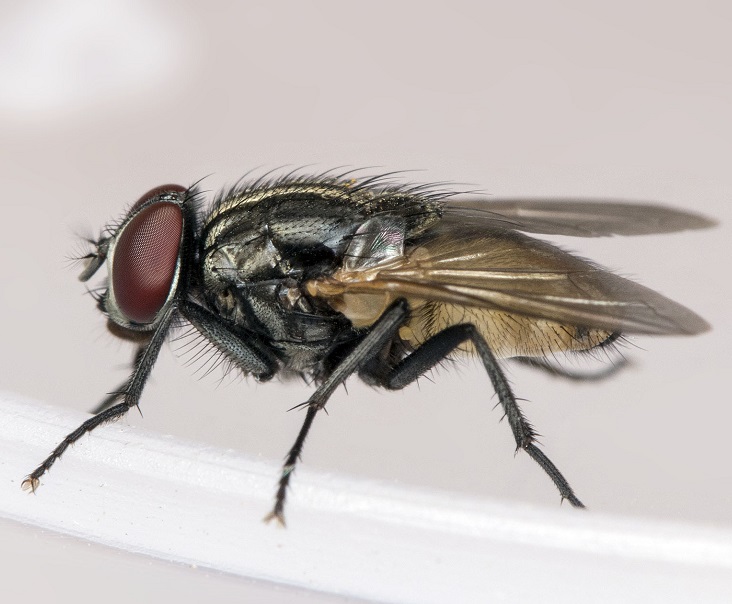Summer means more flies
Like most insects, flies flourish in summer. However, that’s when they also want to move into your home, uninvited. Consequently, keeping flies out of the house can become a summertime obsession, but we can help.
Flies – the ultimate germ spreader
The types of flies you get in your home will depend upon where you live. For example, if you live near the beach or near farmland or the bush. The flies that cause Auckland householders the most aggravation are house flies, lesser house flies and blow flies. These three fly species can all spread germs and diseases. How do they redistribute these germs wherever they land? Through the bristles on their legs. Flies have six horrible, hairy legs.
But wait, there’s more fly horror
Firstly, flies feed by vomiting saliva onto any food they find. The bacteria from a fly’s gut can transmit anything from food poisoning to cholera. Once they have thrown up everywhere, they then stamp their disgusting, dirty little legs up and down in the sick before sucking up the resulting liquid. Hence, their legs are full of germs from their guts which they spread as they merrily fly about and land in your home.
How to keep flies out of the house
One of the best ways to avoid having to deal with flies over the summer is to prevent them from coming indoors in the first place.
In this blog, we have a number of handy tips on how to keep flies out of your home over summer.
Ways to keep flies out of the house
1. Keep food areas clean.
Flies are drawn to meat, fruit and vegetables, so keep food covered to keep flies from feeding off your next meal. Clean up all food and drink spills as soon as they occur. Keep wiping down surfaces where food is stored, prepared or eaten regularly. Keep the sink area clean. Don’t leave dirty dishes lying around or stacked in the sink. Don’t leave the fruit bowl out. Put it in the cupboard.
2. Make sure all food waste is correctly disposed of.
Put it in a bin and make sure it has a lid that closes properly.
3. Keep your bin clean.
Rubbish bins are super attractive and are often where females lay their eggs. Have a small bin in the kitchen so you empty it more often and it doesn’t get a chance to fester. Then have a larger, well-sealed bin outside, away from windows and doors. Consider freezing food scraps until rubbish day.
4. Have a compost bin?
Put it as far away from the house as possible.
5. Clean up after your pets.
Faeces is the perfect breeding place for flies.
6. Remove any dead flies.
These can also be a food source for other pests.
7. Deny flies access to your home by installing fly screens.
There are a number of options available that range in price. Maybe not too gorgeous to look at, but they are the most effective way of being able to enjoy the summer breeze through open doors and windows without having to experience those horrible, noisy home invaders.
8. Get the wind up them.
Flies don’t like getting blown around, so switch on any fans you have in the house. Good air circulation throughout your home also helps.
9. Plant herbs and flowers that repel flies.
Put plants such as basil, peppermint, marigold, lavender, bay leaves and catnip around the house, inside and out.
10. Set traps and repellents using everyday household items.
Make peppermint balls by putting about ten drops of peppermint oil on cotton wool balls and leaving them around inside. However, you’ll need to refresh them daily. Mix apple cider vinegar and dishwashing liquid and cover with Glad Wrap. Poke holes in the top. The flies will be attracted, fly in and drown. Mix cayenne pepper with water in a bottle and spray it around. Oil burners with lavender or peppermint oil also work well but remember to keep refilling them.

Prevention is always better than cure
The best way to keep flies out of the house is to limit their access to food and water. However, if they are hanging around your Auckland home or business, they can reproduce quickly and in large numbers. If you have an infestation, it is advised you call the pest professionals.
Our professional fly exterminators will be able to safely and effectively deal with the pests.

